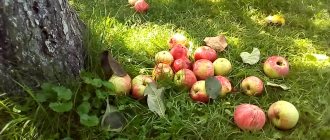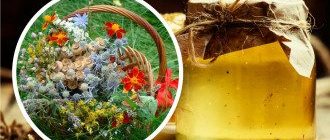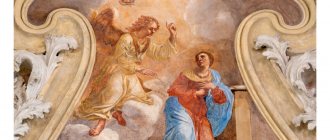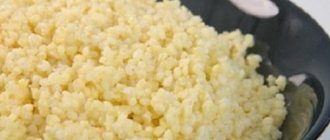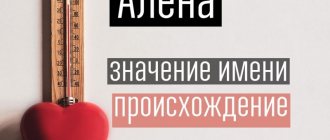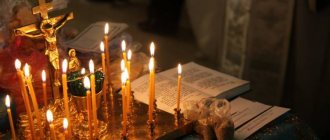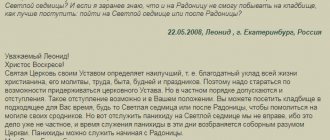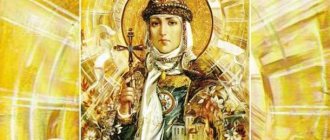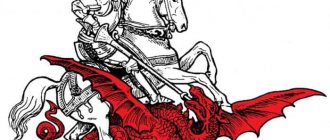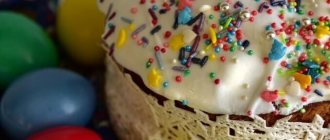Apple Spas is celebrated on August 19 in 2022; it is a holiday with a fixed date, the so-called immutable one. Apple Spas is the second in the cycle of August holidays dedicated to the harvest. It is believed that on this day nature turns from summer to autumn, i.e. transforms
.
Transfiguration of the Savior
And this amazingly coincides with the church holiday celebrated on this day - the Transfiguration of the Lord God and our Savior Jesus Christ. This is how three evangelists – Mark, Matthew and Luke – report this event:
“And after six days Jesus took Peter, James and John, and led them alone up to a high mountain, and was transfigured before them. His clothes became shining, very white, like snow, as a bleacher on earth cannot bleach. And Elijah appeared to them with Moses; and talked with Jesus” (Gospel of Mark, 9:2-13).
Icon of the Transfiguration of the Lord (Theophanes the Greek)
Why is Spas called Apple: the history of the holiday
“Three Saviors. First Savior - Honey Savior, the Cross is carried out. This means that summer is over, the honey can be broken out, the bee is not offended... it’s already gone wild. Second Savior - Yabloshny, Savior-Transfiguration, apples are sprinkled. And why? And here. Adam-Eve sinned, the serpent deceived them with an apple, but it was not ordered, because of sin! And Christ ascended the mountain and sanctified it. That's why they began to be careful. And whoever eats before sprinkling will get a worm in his stomach, and cholera will happen. And once sprinkled, there is no harm. And the third Savior is called the Walnut Savior, the nuts ripened after the Dormition. In our village there is a religious procession, the icon of the Savior is carried, and all the nuts are gnawed. It used to be that we would collect a bag of nuts for the priest, and he would give us milk noodles for breaking fasts.”
(
I. Shmelev, “The Summer of the Lord”
)
Interesting fact: the popular name of the holiday “Apple Savior” was surprisingly intertwined with the church name “Transfiguration of the Lord”; as a result, the holiday in Rus' was simply called the Transfiguration of the Savior.
Other names for Apple Spas:
- Second Spas
- Great Savior,
- Savior on the mountain
- Middle Spas,
- Feast of First Fruits],
- Pea day
- First autumns, autumns
- In Ukraine this holiday was called the Other Savior, the Great Savior
- In Belarus - Yablichny Spas, Vyaliki Spas, Syaredni Spas, Other Spas;
- Among the Serbs, this day was called Preobrazheje; among the Bulgarians - Pribrizine, Prebrazene, Priblizhina, Sotir, Stratir; in Poland it was called Pacskie Przemienienie.
How to celebrate Apple Spas in Russia
On the night before the Great Savior, a solemn service is held in churches, and in the morning there is a festive liturgy and procession of the cross. Afterwards, the priest, reading a special prayer, sprinkles the harvest with holy water.
The clothing of the clergy and parishioners must be white. This color is a memory of the Tabor radiance, which symbolizes man’s desire for the image and likeness of God.
On the Day of the Apple Savior, churches are decorated, and the solemn atmosphere reminds parishioners of the great event - the Transfiguration of the Lord. The Church advises you to think about your life, to cleanse your thoughts and soul of everything superfluous, that is, to be transformed spiritually.
Traditions
The main symbol of the holiday is apples, as the personification of abundance, prosperity, peace, and comfort in the home. During this period, the tables are crowded with a variety of dishes and drinks. On the day of the Apple Savior, fairs were opened and folk festivals were held.
According to popular belief, until August 19, it was forbidden to eat pears, grapes, and apples, which were considered not yet ripe. On the day of the Apple Savior, it was necessary to take the harvest to the temple, consecrate it, and then generously share it with neighbors, relatives, and the poor. It was customary to give blessed apples and other seasonal fruits to everyone, young and old.
Young girls loved to start the day by eating sweet fruits. Dipping a poured apple into honey, they took a bite and made a cherished wish. If the message came from a pure heart, then it came true.
And today the main traditions that are sacredly revered on the day of the Apple Savior have been preserved:
- Blessing of the new harvest. They include not only apples, but also grapes and other tree fruits, which parishioners bring to church in wicker baskets.
- Tradition of remembering the dead. When visiting a cemetery after a festive service, it is customary to leave blessed fruit on the graves of deceased relatives as a sign of respect.
- Congratulations on Apple Savior are not complete without treating relatives and neighbors to delicious baked goods. It is customary to bake apple pies with the addition of honey, nuts, and make jam. Also on the table there must be pancakes with different fillings, gingerbread cookies, and fruit compote.
Signs
By the way the day passed, people already knew what kind of winter awaited them.
If the weather on the day of the Apple Savior was clear and sunny, then the winter promised to be snowy, without severe frosts.
Rain foreshadowed wet and cold weather for the winter months, and yellowing leaves indicated an imminent cold snap.
First Autumn: the first meeting of autumn
Autumn is a separate cycle of holidays associated with the welcoming of autumn, marking the change of season. It is clear that autumn does not come in one fell swoop, in one day, like everything in nature, it is a gradual process. The first meeting of summer and autumn takes place right on Apple Spas, August 19th. further in August there will be the second Autumn, the second meeting of autumn, and the third, marking the final arrival, will occur on September 21, after the “Indian summer”.
The first autumn is a joyful but troublesome holiday. People are grateful for the harvest, but work is still in full swing, harvesting is in full swing, and there is no time to rest.
What is Spas
First you need to understand the etymology of the term. Despite the fact that the Dormition Fast is carried out by the Church in honor of the Mother of God and the remembrance of her Dormition (death), traditionally the August Savior is dedicated to Jesus Christ. The Slavic folk holidays of the agrarian calendar, associated with the end of the season and the harvest, after the arrival of Orthodoxy on Russian soil coincided with the following events:
- By wearing down the honorable trees of the Life-Giving Cross;
- The Transfiguration of our Savior Jesus Christ;
- Transfer of the “Icon of the Savior Not Made by Hands” to Constantinople.
In the syncretic (combining heterogeneous elements of something) tradition of folk Orthodoxy, canonical events turned out to be inseparable from Slavic customs. Our ancestors in these days honored the Son of God, but at the same time did not forget about field and harvest work. In addition to church traditions, folk rituals are unusually strong these days. Some pre-Christian holiday names have been preserved. So, the First Spas was called Kalinnik, and the Second - Oseninami or Pea Day.
Is it possible to eat apples before Apple Spas?
We have already said that the ban on eating the fruits of a new harvest before their consecration arose at the dawn of Christianity. In principle, the custom is very logical and reasonable: what is blessed by God will bring more benefit to a person. But modern life, especially in the city, is no longer subject to the agricultural cycle. Now we more often buy any products in the store, and they are available all year round, including the new harvest.
To answer the question of who should not eat apples before the Apple Savior, we need to remember that in the villages there is still a folk custom of prohibition. It concerns families with deceased children, as well as women who have had miscarriages or abortions. The Eastern Slavs believed that in the next world, children whose mothers had not eaten apples until that day were given gifts - heavenly apples, pears, grapes - on the Apple Savior. And those children whose mothers forgot about it and ate it get the stubs.
Women who lost their children and did not have time to baptize them took blessed apples to the graves of their dead children at Yablochny Spas and left them there with a special spell. It is believed that this facilitates and, over time, completely removes the program that turns the unbaptized, suspended soul of a child into a demon.
Therefore, if you have a history of the cases described above, I advise you to try not to eat local apples from the new harvest before the Apple Savior. Nowadays they are brought from all over the world - from Argentina, Africa, Chile... If you really want them, take them as a last resort. And it is better to take fresh apples blessed on the Second Savior to children’s graves on the basis of: one - to the one who is buried in it, the other - to the one to whom you want to give it. Ask for the transfer of the saving apple in your own words, say that you love the one who left. In general, everything here should come from the heart. Apple Spas is one of those rare days of the year when you can alleviate your situation and the post-death of a deceased or unborn child.
Honey saved
On this day, honors are paid to the “All-Merciful Savior and the Most Holy Theotokos” in memory of Grand Duke Andrei Bogolyubsky. In 1164, the ruler, together with his army, opposed the pagans inhabiting Volga Bulgaria. It was his custom to carry the Life-Giving Tree ahead of the soldiers, and he always took with him an icon of the Mother of God. The incident described in the legends happened on August 1, when, with God’s help, the prince managed to defeat the pagans: rays of divine light emanated from the icon with the Blessed Virgin Mary, which gave strength to the Russians to win the battle. On the eve of the holiday, an evening service is always held, and the Cross of the Lord is brought to the throne so that every believer has the opportunity to venerate it. On the day of the Bearing of the Life-Giving Cross, at the morning service, an image of anointing parishioners with oil is performed. Clothes for worship on this day are worn in purple or dark red. After the completion of the liturgy, the consecration of water, honey and other gifts of God begins.
By the beginning of August, honey was already ripening in the hives, and the bees stopped working and were preparing for the winter. Only after blessing the collected supplies in the church, people could try what the bees produced this year. Honey was considered a gift from God, a grace sent from above, so people went to temples to thank the Lord for his mercy. In addition to the procession of the Cross, reservoirs and wells were blessed on this day.
People call this day Makovei. It is a mistake to think that this name is associated with poppy or the fact that it just ripens in the meadows. Of course, in colloquial etymology this meaning has already been established, but initially there was a completely different connection. August 1 (14) is the day of remembrance of the Seven Holy Martyrs of the Maccabees, who, according to the Old Testament, accepted their martyrdom back in 166 before the birth of Christ.
Sayings and signs of Honey Spas
Honey spas is a kind of beginning of the final summer phase. Nature is moving towards autumn, towards a long sleep, so people prepared for the cold in advance. After the holiday, people no longer swam in open reservoirs, because the water began to bloom and get colder. It was considered a good omen that if it rained on Makovey, then the next summer would be without fires.
Such a saying as “plow for winter, this winter” meant the beginning of sowing work for planting winter varieties of wheat and rye. On this day they prepared manure and compost for the winter, and bathed the horses. But if the weather was damp, then sowing rye was postponed for several days. Another proverb said that “Savior has everything in stock.” This meant unpredictable weather. It could rain or get strong winds.
What not to do at Apple Spas
Apple Spas is one of the favorite folk holidays. This day continued the cycle of harvest, satisfaction, joy, gratitude for a successful year. It was believed that on this day one must give thanks for what one managed to collect, receive, and achieve. Also on this day it was necessary to remember the ancestors, commemorate them, please them with a saving apple, thank them and ask for help in future matters.
On this day it is very good to help those in need; this is one of the few moments when you cannot accidentally “give away” your wealth. On the contrary, people who share their fruits and harvest with those in need on Apple Day receive a special blessing for this. Therefore, if everything is fine and prosperous with you, I advise you not to be greedy, take at least an extra kilogram of apples, consecrate them and distribute them, or leave them in the church; the ministers themselves will distribute them among those being served.
If possible, go to the cemetery, leave a blessed apple on the graves of your relatives (you can add other fruits). Light a candle, read a memorial prayer, if you don’t know, ask in your own words that everything will be fine with the deceased, thank them for giving you life and for the fact that this year you will have a harvest again.
Tea party at Apple Spas
Visit your relatives, treat them to blessed apples, bake something as a gift and sit down at the table together. Only this should not be a formality, violence against oneself. The atmosphere should be truly joyful, cozy, calm - like an August evening, when the sun gilds the country veranda, where the family has gathered for evening tea, the crazy smells of charlotte from “their” apples are already emanating from the table, children are fiddling and laughing, adults are talking and life seems so endless...
Apple Spas is a very joyful holiday, you need to try to evoke and maintain this feeling of universal joy. Try not to succumb to provocations, not to get irritated, and not to quarrel. Don't let others "lower" your sound on this day.
On this day it is strictly forbidden to offend nature. Actually, this should never be done at all, but on Apple Savior it is believed that God asks the earth and plants if anyone has offended them, and punishes the offenders.
The meaning and essence of the holiday
Since Middle Savior is both a Christian and pagan holiday, religious and folk traditions are closely intertwined in it. In Orthodoxy, it is customary to celebrate it with prayers, and unchurched people organize feasts.
During the Savior, a prayer service is performed in honor of the giving of fruits.
Religious
Apple Savior coincides with the Transfiguration of the Lord, which is one of the twelve holidays dedicated to the events of the earthly existence of Jesus Christ and the Virgin Mary. Celebrating this date, Christians remember the mystical metamorphosis of the Savior on Mount Tabor. It is believed that in this place the spiritual and physical foundations of the Son of God were united and his true nature was revealed.
During the holiday, a thanksgiving prayer is performed in honor of God’s gift of all “earthly fruits.” On this day, it is customary for believers to bless apples from the new harvest in churches. Orthodox people also reflect on the righteousness of their lives, mistakes made and necessary changes.
among the people
According to folk customs, the Great Savior marks the onset of autumn and the transformation of nature. On the day of its celebration, the apple picking ends. In gratitude for a good harvest, ancient people sacrificed fruits to the pagan gods and organized large celebrations with songs and dances.
What to sanctify in the church on Apple Savior
“They’re setting up a table for the eve. The golden-blue sexton carries a huge silver dish with a mountain of red apples on it, which came from Kursk. There are baskets and bundles all around on the floor. Gorkin and the watchman drag familiar baskets from the pulpit and move them “under the sprinkling, closer.” Everyone is fussing and having fun - not church at all. The priests and deacon are in extraordinary robes called “apple robes.” On the green and blue brocade, if you look closely from the side, large apples and pears and grapes are golden in the leaves - green, gold, blue: shimmering. The priests bless the water. Then the elder, in a purple kamilavka, reads a prayer for fruits and grapes over our apples from Kursk - an extraordinary, cheerful prayer - and begins to sprinkle the apples. He shakes his brush so much that the splashes fly like silver, sparkling here and there, separately sprinkles the baskets for the parish, then the bundles, the baskets... They go to the cross.”
. (Ivan Shmelev, “The Summer of the Lord”)
On Apple Savior in the church they usually consecrate various fruits, most often they are fruits, but if you want. You can also add vegetables. I also advise you to clarify, and if on the third, Nut Spas, nothing is blessed for you, put nuts in the basket at the Apple Spas. Take unpeeled, in shell: coconut, walnuts, almonds, etc., depending on what you like. These nuts will be useful to you throughout the year. At the same time, you can put fabric for embroidery or other needlework in the basket - but only that which you plan to use for yourself. For example, embroider a tablecloth, napkins, towels - of course, in a special way, with the right patterns, so that these things become real family amulets, and not just “textiles”.
Cart at Apple Spas
Let us remember that the second name of this holiday is Transfiguration. Therefore, you can also put jewelry made and charmed for beauty and charm into the basket for consecration. Of course, it is better to disguise everything in the basket except fruits and vegetables so as not to attract unnecessary attention. Fabric - on the bottom, decorations in the folds, nuts - between the apples, etc.
You need to collect a basket for consecration from the heart, with love and gratitude to the world that gave it all to you. So that when you look at her, your eyes will rejoice and your heart will warm.
General information about Yablochny Spas
In Orthodoxy, the Great Savior is the second of 3 harvest festivals celebrated during August. It is held as part of the Dormition Fast, established in the calendar in honor of the Dormition of the Blessed Virgin Mary.
The holiday originated in pre-Christian times and was associated with the beginning of the collection of ripe fruits.
In Byzantium there was a tradition of blessing the harvested grapes during the Feast of the Transfiguration of the Lord. In Russia, it was customary to bless apples, because they are more common.
Rituals for Apple Spas
For a wish for a saving apple
It is believed that on the Transfiguration the sky opens, you can see God and make a wish that will surely come true (as on Epiphany or Christmas).
Therefore, I advise you to use a very simple but working ritual for the saving apple. The only condition is that the desire must be only for oneself and for the good. Those. It won’t work to wish for your husband’s salary to be raised or for his daughter to get married - let them wish for themselves. I really don’t recommend wishing that a nasty colleague be fired or that a man and his wife divorce and leave for you.
So, on August 19 you will need to bless the apples; first select one of them and remember. In church, light a candle to the icon of the Transfiguration and ask in your own words to bless your desire and “transform” the situation. When you arrive home, take the apple you wished for and eat it, imagining that your wish has come true. take your time, eat mindfully, enjoy the taste, savor it. At the same time, when you swallow the first piece, say: “What is dreamed up is far-fetched!”, On the second piece: “What is thought up will come true!” and on the third - “What will come true will not pass!”
I advise you to remove the seeds from this apple, dry it and set it aside, they will come in handy later.
A treat for the ancestors
On Apple Spas, as on all holidays of the harvest cycle, they remember and thank their ancestors, thereby “watering the roots” that feed you—the “branches.” On this day it is very good to cook something from apples, berries or seasonal fruits. I highly recommend baking a round pie with apples, and making a lattice of dough on top in the shape of an “orei” symbol.
Apple Pie with Orepei Lattice
Orepei (other names: “burdock”, “oak”, “well”) is a combed rhombus, a sign of the earth and ancestors. This symbol “catches” and attracts happiness, luck and prosperity, and also helps restore and strengthen connections between generations of the family.
Symbol "Orepei"
Charlotte dough will not work here, make a regular pie dough, if you are fasting, you can use lean dough.
While it is hot, place the pie on the window (lay down a light, clean cloth in advance), light a candle, in your own words invite your ancestors to taste the treat, thank them. Sit for a couple of minutes, listen to yourself - very interesting thoughts, images, and phrases may come to you.
Rolling out the disease with a saving apple (translation)
Bless 3 apples separately (put them in a bag next to the basket, for example). In church, light a candle in front of the icon of the Transfiguration, ask in your own words to take the disease and give it “transfiguration.” At home, roll three apples in turn over the problem area of the body with the words “I roll the apple, I roll everything bad, everything bad, everything that hurts into the apple (list what worries you). I collect every drop and close it in an apple.” Take the apples out of the house, bury them in the ground, in separate holes, with the words “All the evil in the ground left me, it was covered with stones, it was covered with earth, I was transformed.”
Apples for spreading disease
This is not a panacea or a replacement for doctor’s prescriptions! This is an action to help, “complex therapy”, something that will patch up holes on the subtle plane in parallel with the treatment of the physical body.
Poems about Apple Savior
Boris Pasternak "August"
AUGUST
As promised, without deceiving, the sun penetrated early in the morning with a slanting strip of saffron From the curtain to the sofa.
It covered the neighboring forest, the houses of the village, my bed, my wet pillow and the edge of the wall behind the bookshelf with hot ocher.
I remembered why the pillow was slightly moistened. I dreamed that you were walking through the forest one after another to see me off.
You were walking in a crowd, separately and in pairs, Suddenly someone remembered that today is the sixth of August in the old days, the Transfiguration of the Lord.
Usually light without flame comes from Tabor on this day, and autumn, clear as a sign, attracts the eyes to itself.
And you walked through the small, beggarly, naked, trembling alder forest, into the ginger-red cemetery forest, burning like a printed gingerbread.
The sky was adjacent to its silent peaks, And the distance echoed with the voices of cocks in a drawn-out manner.
In the forest, as a government surveyor, Death stood in the middle of the graveyard, Looking into my dead face, To dig a hole according to my height.
The calm voice of someone nearby was physically felt by everyone. Then my visionary voice sounded untouched by decay:
“Farewell, the azure of Preobrazhenskaya and the gold of the second Savior, soften the bitterness of the fateful hour with the last feminine caress for me.
Goodbye years of timelessness. Say goodbye to the abyss of humiliation. Challenging woman! I am your battlefield.
Farewell, the spread of the wingspan, the free perseverance of flight, and the image of the world revealed in the word, and creativity and miracle-working.”
Alexander Blok "Transfiguration"
On the bright day of the Transfiguration, the spirit of a madman is struck: Out of captivity, out of confusion, he heard Your Voice.
Now mournful, now poor, In the bosom of the Eternal Father, Near You, in the pale azure Thirsts for a new end...
Sergei Yesenin “Transfiguration”
The hour of Transfiguration is ripening, He will come, our Bright Guest, To remove the rusted nail from crucified patience.
From morning to noon, With thunder singing in the sky, He will fill our everyday life with milk like buckets.
Recipes for Apple Spas
Charlotte
This is probably the most famous, popular, simple and at the same time favorite pastry with apples. It seems to me that all girls start learning to bake with it, because it’s easier just to buy it).
Charlotte with apples
There are a huge number of options for preparing charlotte, but we will make the classic version.
You will need:
- 1 cup of sugar
- 1 cup flour
- 3 eggs
- 5 apples
Preparation:
- Wash the apples (if store-bought, it is better to peel them), remove the core, cut them.
- Beat eggs with sugar for 5-7 minutes, add flour, mix, you get a liquid dough.
Tip: Take the time to beat the eggs with sugar, this will give you a meringue-like crust on top of the charlotte.
- Lightly grease the baking sheet with oil, sprinkle with breadcrumbs, or simply line it with baking parchment. You can lay it out in layers: pour half of the dough into the mold, lay out the apples, pour in the remaining dough.
- Place in an oven preheated to 180 degrees and bake for 40-60 minutes (depending on the oven). Check the readiness with a toothpick as soon as the delicious smell of pie wafts through the kitchen: if there is no sticky dough, the charlotte is ready.
Apple pie
This option is a little more complicated than charlotte, but also not at all troublesome. And most importantly, it is easy to make decorations from such dough, so you can make the same pie to treat your ancestors. Let me remind you what it should look like:
Apple Pie with Orepei Lattice
You will need:
- 1 kg of apples, preferably sweet and sour or sour. In principle, Antonovka is always a win-win option)
- 150 g sugar
- 200 g butter
- 5 eggs
- 2 tsp baking powder
- 600–700 g flour
Cream (if you don't like it, skip this step)
- 500 g sour cream (15–20%)
- 150 g sugar
Preparation
- Grind butter with sugar
- Add eggs, mix
- Add baking powder and flour, knead the dough
- Peel the apples, remove the core, cut into thin slices.
- Line a baking tray (approximately A4 size) with baking paper or grease it with butter.
- Place 2/3 of the dough and smooth it out.
- Place apples on the dough.
- Roll out the remaining dough into strips and place them on the pie in a diamond lattice pattern.
- Place the pie in an oven preheated to 180 degrees and bake for 30–35 minutes.
- For the cream, mix sour cream with sugar and pour over the hot pie. Cut after cooling.
Baked apples
An elementary, quick, tasty, and most importantly, healthy dessert!
Baked apples
- We take apples (choose strong, large ones, Antonovka will work perfectly again), cut them into halves, and cut out the core.
- Place on a baking sheet lined with baking paper or in a mold, pour half a teaspoon of sugar into the indentations (you can replace it with honey, you can put frozen or fresh berries).
- Place in an oven preheated to 180 degrees for 15-20 minutes.
- Similarly, you can bake apples in the microwave: prepare them in the same way, put them in the microwave at maximum power for 2-3 minutes.
Nut saved
The Third Spas is traditionally considered a holiday more of a folk holiday than a church holiday. It falls within the period of the post-Assumption celebrations. On August 29, a vigil is held in churches in memory of the transfer of the Image of the Savior Not Made by Hands to Constantinople. Thus, churches combine two liturgies, and the color of the priests’ robes is considered to be blue, signifying the purity of the Virgin Mary.
On this day, they baked bread from the flour of the new harvest, collected ripened hazel in the forests, adding nuts to dishes and pies. Fairs were organized in cities where linen canvases were traded (hence the name – Canvas). Just like on Medovy, today reservoirs and wells are sanctified, but public bathing is not organized, because by this time the water is already cold, autumn. It is noteworthy that the villagers had no time for festivities on this day, because everyone was busy with work: sowing winter crops, harvesting crop residues.
In addition to morning services, they also visited churches to pray to the martyr Diomede for the recovery of loved ones. In front of the Feodorovskaya Icon of the Mother of God, prayers were offered in requests for successful childbirth and solutions to women’s everyday problems.
Sayings and signs of Nut Spas
On this day we watched the sky. If the cranes were heading south today, they were expecting a frosty winter. Stormy skies and rainy weather that day promised a long, warm autumn.
People thanked the Lord for grain supplies, which was reflected in folklore. If the hazelnut harvested well, it meant that the next summer would be fruitful with a large harvest of wheat and rye.
There were also bad omens. Thus, it was considered a bad sign to collect spoiled nuts when harvesting. This meant that trouble would soon happen. To protect themselves, people ate a bad nut and gave the next one to the first person they met.
How is the festive service going?
The service for the Feast of the Transfiguration of the Lord developed gradually. The texts of the festive service that we hear in churches today were written by Byzantine hymnographers in the 5th–8th centuries. The most famous hymns: Anatoly, Patriarch of Constantinople (5th century), Saints John of Damascus and Cozma of Maium (8th century).
It should be noted that in the festive service the authors of a few stichera are indicated, so we do not know all the hymnographers. The stichera for the feast of the Transfiguration of the Lord describe the events witnessed by Christ's closest disciples, and also contain prophecies about them and an interpretation of what happened.
The texts of the festive service indicate the meaning of the Transfiguration of the Lord. Jesus Christ was transfigured in order to assure the apostles of His Divinity and thereby prepare them for the “vision” of His future sufferings and teach them that people “embellished with the height of virtues will be worthy of Divine glory.”
The canon says that the Transfiguration of the Lord, as it were, illuminated the souls of the chosen ones with spiritual light, revealed to them the deity of the Savior, united in Him with humanity, and confirmed them in faith in the promise of the Lord.
In the transfiguration, the light of Divine nature shone under the cover of human flesh, which in itself, as not involved in sin, was and appeared to be perfect. The Apostle (2 Peter I, 10–19) complements the idea of the canon that the Tabor appearance of the glory of the Lord is proof of His Divine greatness. The Gospel (Matt. XVII, 1–9 v.) depicts the history of the event.
Apple Saved 2022 - what kind of holiday is it and how is it celebrated in Russia
MOSCOW, August 18 – RIA Novosti. The Transfiguration of the Lord, or the Apple Savior, will be celebrated in Russia on August 19 in 2022. What you can and cannot do on this day, the history of the holiday and traditions, its signs, rituals and customs, as well as congratulations on it and other interesting facts - in the RIA Novosti material.
Apple saved 2020
Apple Spas is the most famous of a series of major holidays, during which believers bless the fruits of the new harvest. There are three of them in total. They are dedicated to Jesus Christ.
The first one saved was honey. It is celebrated on August 14th. In the church calendar, the holiday is called the Origin of the Honest Trees of the Life-Giving Cross. According to tradition, honey is blessed on this day.
The second, Apple, falls on the Transfiguration of the Lord. This is one of the twelve holidays - the twelve most important dates of the church calendar. Each of them is dedicated to a specific episode from the life of the Savior or the Virgin Mary. It is called apple because it is customary to consecrate apples.
And the third is bread (or nut). Believers celebrate it on August 29, this is the day of the Image of Christ Not Made by Hands. On the holiday, it is customary to bless grain and nuts.
A priest and believers during a service in honor of the Feast of the Transfiguration of the Lord at the Cathedral of the Exaltation of the Holy Cross in Omsk. August 19, 2017
history of the holiday
The Gospel tells in detail about the Transfiguration of the Lord. According to Scripture, one day the Savior took three of his closest disciples - Peter, James and John - to pray and ascended with them to Mount Tabor.
“And as He prayed, the appearance of His face changed, and His clothes became white and shining. And behold, two men talked with Him, who were (prophets - editor's note) Moses and Elijah; appearing in glory, they spoke of His exodus, which He was about to accomplish in Jerusalem. Peter and those with him were burdened with sleep; but, having awakened, they saw His glory and the two men standing with Him,” testifies the Evangelist Luke.
When the prophets who miraculously appeared began to disappear, Peter exclaimed: “Master! It’s good for us to be here; We will make three tabernacles: one for you, one for Moses and one for Elijah, not knowing what I said.”
By “tabernacles” we mean huts. The fact is that this event fell on the days of the Jewish holiday of Sukkot. Jews, in memory of the wanderings of their people after the exodus from Egypt, build special tents outside their homes. They eat and sleep in them. It was precisely this kind of canopy that the Apostle Peter proposed to install.
Consecration of apples and other fruits in the Church of the Kazan Icon of the Mother of God in Kolomenskoye
“As he said this, a cloud appeared and overshadowed them; and they were afraid when they entered the cloud. And there came a voice from the cloud, saying: This is My Beloved Son; listen to Him. When this voice came, Jesus was left alone. And they kept silent and did not tell anyone in those days what they had seen,” writes Luke.
A holiday was established in memory of this event. According to the theological interpretation, then the two natures of Jesus Christ were revealed - human and divine. As Saint John Chrysostom wrote in the 4th century, the Lord was transfigured “to show us the future transformation of our nature” and the future second coming of the Savior to Earth “on the clouds in glory with the angels.”
When is it celebrated?
According to legend, believers began to celebrate this Christian holiday in the 4th century. Initially, he did not have a clear date. Around the 7th century, Orthodox believers began to celebrate it on August 19. The date of celebration does not change from year to year.
But for Catholics, this date entered the calendar only in the 15th century. They celebrate it on August 6th.
How to celebrate Apple Day
The Transfiguration of the Lord is distinguished by its solemnity. The clergy in churches serves in white vestments - a symbol of the “light of Favor.”
And after the liturgy, the priest reads a special prayer to consecrate the fruits of the new harvest. And then he sprinkles them with holy water.
Consecration of fruits at the Church of the Transfiguration of the Lord in the village of Bolshie Kabany, Laishevsky district of the Republic of Tatarstan
Although according to the charter, grapes are supposed to be blessed on this day. There is a special prayer for him.
“But in the Russian Church, in those places where grapes do not grow or do not ripen by this time, apples are blessed on the Feast of the Transfiguration of the Lord. At the same time, apples, as if replacing grapes, are consecrated with another prayer - “For the consecration of the firstfruits of vegetables (fruits),” the church charter makes an exception.
Do's and Don'ts
It is believed that on Yablochny Spas, as on any other major church holiday, one should not engage in heavy physical labor. However, believers often ask the question of whether it is generally possible to work on this day. The priests note that there are no strict prohibitions on this matter, especially if the work cannot be postponed.
But, for example, it is not customary to celebrate weddings on this day. The fact is that on the twelve holidays, which include the Transfiguration, weddings are not performed in churches. However, if people are not churchgoers, then marriage these days, as the clergy say, is their own business.
The most important thing on the Feast of the Transfiguration is to come to the church service, pray at home and remember together with your fellow believers about this gospel event.
According to representatives of the clergy, there is nothing wrong if a person does not bless apples and other fruits on this day. The main thing is participation in church prayer. In addition, on this day you can go to the cemetery and honor the memory of deceased relatives. However, priests call the custom of placing blessed apples on graves superstition.
Traditions and signs
In addition to the church tradition of blessing the fruits of the new harvest, there are many folk customs and signs.
In the old days, after the blessing of apples, it was customary to bake pies. They were treated to relatives and neighbors.
And the girls that day, breaking their fast with apples, said: “What is planned is far-fetched! What is far-fetched will come true! What will come true will not pass! It was believed that thanks to this conspiracy, a betrothed one would appear.
They also looked closely at the weather at Yablochny Spas. It was believed that if this day turned out to be cold, then January would be harsh.
There are many other signs for the Feast of the Transfiguration: “Like the day of the Second Savior, so is the Intercession (October 14 – editor’s note).” Or: “A dry day foretells a dry autumn, a wet day foretells a wet one, and a clear day foretells a harsh winter.”
Apple saved in painting and literature
This holiday has been one of the most revered in Rus' since ancient times. Therefore, many works of Russian art are dedicated to him.
The famous Russian artist Boris Kustodiev dedicated his creations to the holiday. His most famous painting on this theme is “On the Terrace”.
© Boris Kustodiev
Painting “On the Terrace” (1906)
The festive traditions of this date are also played up by another famous painter Isaac Levitan in the painting “Blossoming Apple Trees”.
Leo Tolstoy wrote about the holiday in “War and Peace”, Fyodor Dostoevsky in “The Possessed”. Particularly famous are the stories of Ivan Bunin “Antonov Apples” and Ivan Shmelev “Apple Saved”.
Congratulations
There are no established speech formulas for addressing each other on the day of this holiday. In churches you can hear: “Congratulations on the Feast of the Transfiguration of the Lord!” And among themselves, believers usually say: “Happy Apple Savior!” Or more often just: “Happy Holidays!”
However, many poems and sayings are dedicated to the Apple Savior. They also customarily congratulate each other:
On Apple Day I wish you well, Joy in your heart today, always, Peace in your soul and great patience, You will enjoy the ripe fruits. May this holiday bring goodness, May it be light, easy, good for you.
Permissions and prohibitions on the holiday
There are no strict instructions on how to behave on this holiday. Believers themselves understand what should be done on fasting days, and what it is better to refuse. In addition to food restrictions, it is recommended to postpone work in the field or garden for a day.
The Assumption Fast is considered strict, but on the day of the celebration fish and red wine are allowed. On the tables there are traditional pastries with apples, but always lean. Dishes with fruits (apples, pears, grapes) and berries should not be forgotten even today. You can treat your family to traditional, easy-to-prepare charlotte, or you can try more complex culinary masterpieces - rolls, gingerbreads, and open-faced pies.
It is customary to eat fruits blessed in churches and distribute them to relatives, children, and the needy. It is forbidden to throw away overripe apples; it is better to bury them in the ground. You cannot quarrel in celebration, wish harm to other people, or swear. According to legends, an evil word on this day will return to the owner and bring grief, so it is better not to curse. Pure thoughts, friendliness, cordiality - these are the main things that should be in the minds and hearts of people on this bright holiday.
